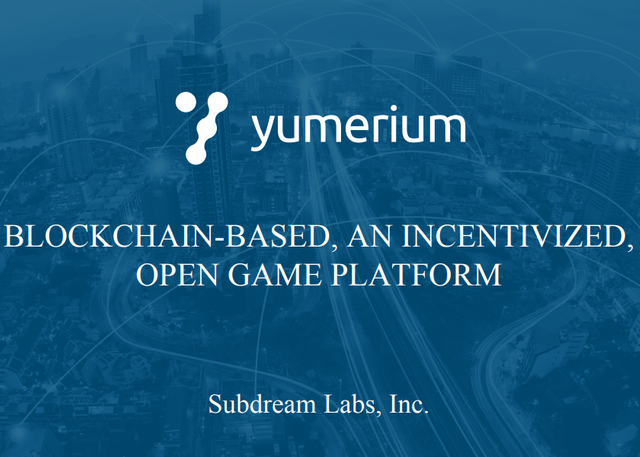
One of the areas that seem most ripe for blockchain implementation is the video game industry. While thriving and hugely popular, it also suffers from a number of major problems that prove especially hobbling for the small or “indie” game developers who form much of its creative vanguard. Crowdfunding and digital distribution are two vital mechanisms behind the current golden age of video games, but both are generally conducted through third-party platforms that require large fees. Large companies are difficult to compete with in marketing. They are also much better equipped for the digital rights management arms race with video game pirates. All of this takes a big bite out of smaller indie budgets, discouraging developers.
Decentralisation through blockchain technology could be the solution to at least some of those problems. Subdream Studios, a social VR game developer, offers one way in which this could be done. Its idea is a video game distribution, promotion and crowdfunding network, fueled by a specialised Yumerium token (YUM) used both for regular transactions and as an incentive mechanism for players.
How shall the Yumerium platform work?
Yumerium will provide a number of promotion options to developers who choose to add their mobile or PC games to its store. Most of them will revolve around the use of YUM tokens, a certain amount of which will be allocated to each game as a smart contracts-controlled “seeding fund” to be used in incentives (when it runs out, developers could buy more YUM with which to give out more rewards or access other marketing options). Players, whose accounts will be linked to their wallets, will receive YUM rewards for certain gameplay achievements, top scores, victories in tournaments, referrals (done with a special code) and reviews. All of this will be done at the developers' discretion, and they could determine the details and timing of reward programs or set up their own reward mechanisms if they like. For instance, they could create and integrate their own review sites. Otherwise, reviews will be made on the platform itself, with rewards determined by their upvotes. The incentive program will run on smart contracts, executed either automatically or after developers' approval, with a special formula that will ensure diminishing returns with every transaction, meaning that the earliest players will get the biggest rewards.
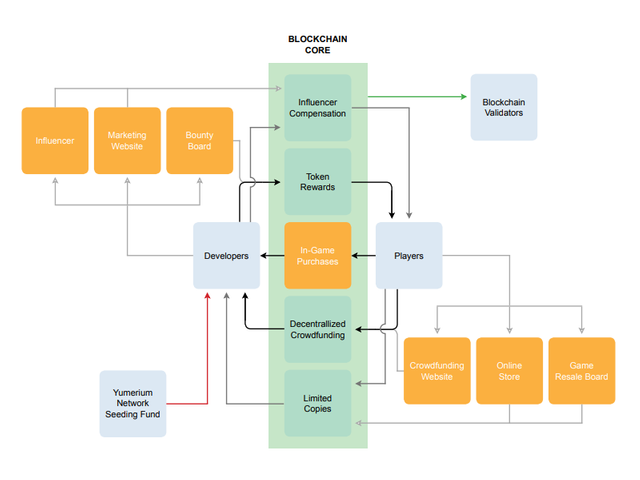
Both game and in-game purchases made with YUM will come at a discount. Developers will be able to offer exclusive collectibles and limited edition copies to players who would be able to display them to others, along with their verified achievements and stats. Ownership on both developer and user side is going to be reinforced through smart contracts, which would create more options. Developers will be able to implement seamless share distribution on purchases. Players will be able to sell their licenses on Yumerium's second-hand game market, with part of the profit going to developers. Open-source SDKs will be available to easily integrate Yumerium's mechanisms with all popular game engines, with new ones being added on request.
Last but not least, Yumerium will also provide decentralised crowdfunding options that could be used on the platform or on the developers' sites. All contributions will be handled through smart contracts, ensuring both reliability and transparency in all transactions. Optionally, developers could implement gradual transfers in which they will receive a part of the funds for reaching every milestone, proving their commitment to going all the way and gaining the contributors' trust.
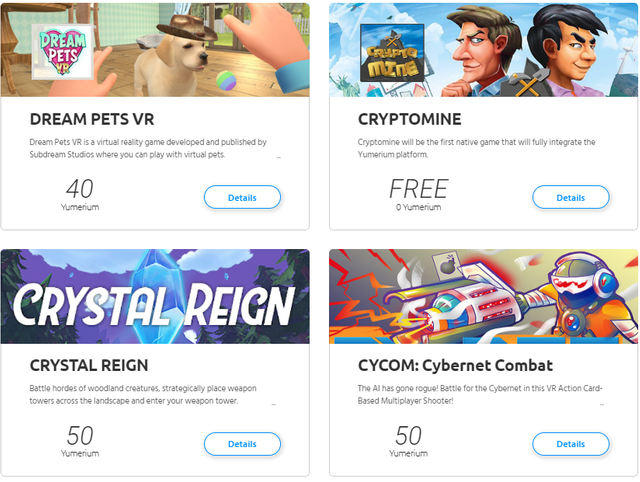
What might make Yumerium appealing for stakeholders?
Yumerium offers its users all the usual advantages of blockchain technology. By cutting out the middleman, it should reduce costs for everyone involved while giving them added flexibility, security and transparency. On top of that, it gives developers many tools with which to attract players while also deterring pirates who should find it impossible to gain the same advantages as paying customers. Using token rewards should both encourage active and early engagement with specific games and help tie together a broader ecosystem, in which rewards earned in one game can go towards buying or funding another. Taken together, the platform's features should make game development more affordable for smaller developers while also giving extra value to their players.
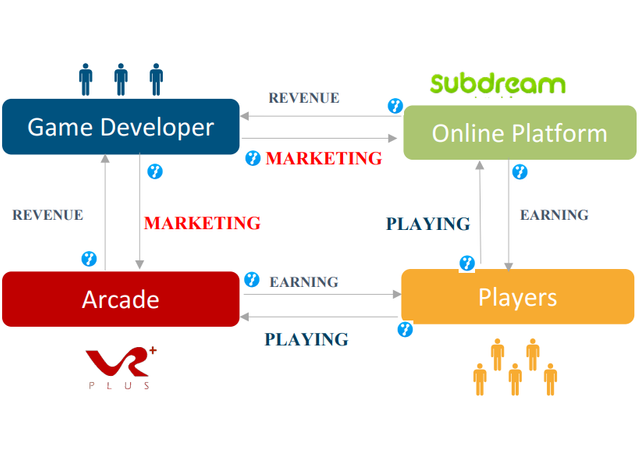
Subdream Studios is an experienced game developer and has important partners in the cryptocurrency, gaming and VR gaming industries. It also has skin in the game, as the first game to be added on the platform will be its own CryptoMine, a free casual strategy game in which players will be able to earn prizes, setting them up for further participation in the system. Its connections should help it attract other developers as well. Unsurprisingly given the company's roots, VR games will be fully supported and the system will be connected to the VR Plus chain of arcades in South Korea, owned by the same company. There has been some recent dissent among the gaming community towards existing game distribution and payment models, and Yumerium might be able to capitalise on that.
Token sale details
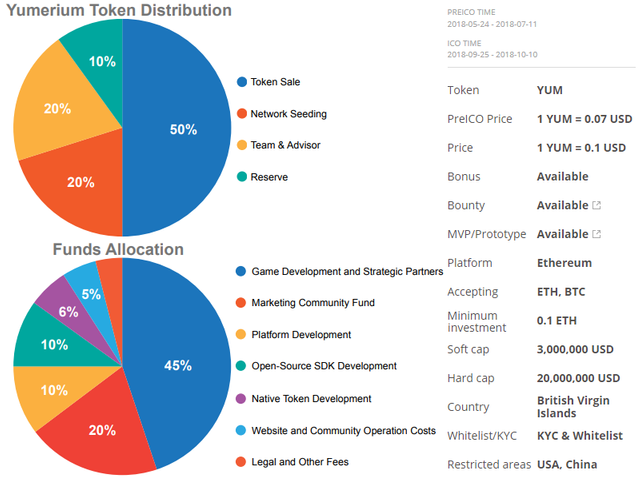
A blueprint for a more integrated game ecosystem
For some time now, two models have dominated the video game market: pay-to-play and free-to-play, the latter of which is generally a misnomer as despite players being able to play freely, those games often offer a large amount of in-game purchases that offer a completely different level of quality. Yumerium offers a genuine alternative to those increasingly unpopular options: earn-to-play, in which players will not only invest their money in the product but also get something back that could be reinvested elsewhere.
It is an interesting proposition, but, of course, its success is far from assured. In addition to attracting enough developers and players, Yumerium will also have to make sure that its token will be worth something for its incentive models to be worth anything. It may also want to keep an eye on competing blockchain-based game platforms that offer comparable advantages. The quality of the games it attracts is also important, as marketing cannot rescue a bad product, and many casual games leave much to be desired. Still, its design is original and purpose-driven, and given the right execution it could become a serious player on the market.
Links:
Website: https://www.yumerium.com/
WhitePaper: https://bit.ly/2LawvLq
Telegram: https://t.me/yumerium
Facebook: https://www.facebook.com/Yumeriumtoken
Twitter: https://twitter.com/yumeriumtoken
ANN: https://bitcointalk.org/index.php?topic=3272290.0
Author: https://bitcointalk.org/index.php?action=profile;u=2201409
Disclaimer
This review by Bonanza Kreep is all opinion and analysis, not investment advice.
I like your content ! just followed you - Keep Up !
Downvoting a post can decrease pending rewards and make it less visible. Common reasons:
Submit
Thanks for your feedback.
Downvoting a post can decrease pending rewards and make it less visible. Common reasons:
Submit